Vintage Treasures: The Best of James Blish
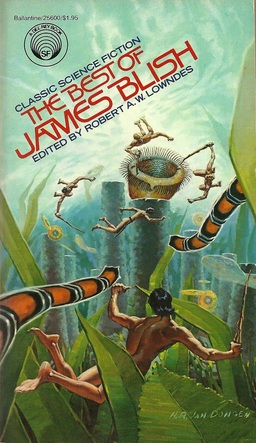 And so we come to the final Classics of Science Fiction volume, The Best of James Blish, published in August 1979.
And so we come to the final Classics of Science Fiction volume, The Best of James Blish, published in August 1979.
Final as in the last one published, not the last one we’ll talk about here. We’re at roughly the halfway point in terms of coverage, as I’ve only written about 11 of the 21 volumes so far. I’m not covering them in chronological order (but that probably would have been a good idea, now that I think about it).
As we’ve discussed in the Comments section of previous posts, Lester Del Rey’s Classics of Science Fiction library is perhaps the finest mass market survey of early 20th Century short SF and fantasy. But looking at it purely from a historical viewpoint, it sure made some odd choices.
Where’s the Best of Robert A. Heinlein, for example? Or Isaac Asimov? Arthur C. Clarke? For that matter, Jack Vance? Keith Laumer? A.E. van Vogt or Gordon R. Dickson? Larry Niven, Harlan Ellison, Ray Bradbury, Robert Silverberg, Poul Anderson, Ursula K. Le Guin, Theodore Sturgeon, Frank Herbert, or Anne McCaffrey?
The answer is simple, of course. Del Rey was limited to publishing the stories he could get rights to — and the short fiction of many of the genre’s top writers, including Asimov, Heinlein, Bradbury, and Clarke, was tied up with other publishers. It’s a wonder he was able to acquire as many top-flight writers as he did.
And there were obviously commercial factors weighing on his selection as well. While some of his early authors — like John W. Campbell and Stanley Weinbaum — had stopped producing fiction decades ago, Del Rey caught on quickly to the idea that his popular Best of… line was a great way to introduce readers to his midlist authors. And so later entries included The Best of Raymond Z. Gallun and The Best of Hal Clement, authors with a much lower profile than Leiber, Henry Kuttner, or Edmond Hamilton, but who had the good fortune to have books in print from Del Rey in the late 70s.
As Keith West pointed out in the Hal Clement discussion thread, Pocket Books picked up on the idea, and promoted many of the authors they had under contract with their own Best of… line, with an impressive line of paperback collections devoted to Jack Vance, Keith Laumer, Walter C. Miller, Damon Knight, Harry Harrison, John Sladek, Poul Anderson, Robert Silverberg, Barry N. Malzberg, Mack Reynolds, Charles Beaumont, Wilson Tucker, A.E. van Vogt, and Randall Garrett.
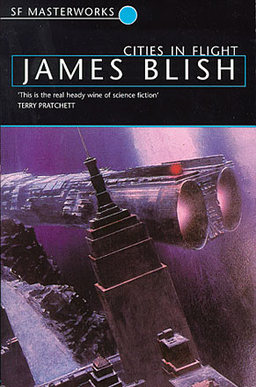 Over at DAW, Don Wollheim did the same thing with The Book of Fritz Leiber (Volumes One and Two), John Jakes, Andre Norton, Van Vogt, Fred Saberhagen, Brian Aldiss, Gordon Dickson, and Poul Anderson. (Sharp-eyed readers will notice that Del Rey had a Leiber title as well — making Fritz Leiber the only author with volumes in multiple series. One of the advantages of having more than one publisher, I imagine.)
Over at DAW, Don Wollheim did the same thing with The Book of Fritz Leiber (Volumes One and Two), John Jakes, Andre Norton, Van Vogt, Fred Saberhagen, Brian Aldiss, Gordon Dickson, and Poul Anderson. (Sharp-eyed readers will notice that Del Rey had a Leiber title as well — making Fritz Leiber the only author with volumes in multiple series. One of the advantages of having more than one publisher, I imagine.)
Even Berkley Books got in on the act, with The Book of Frank Herbert and The Book of Philip Jose Farmer. Apparently, when you hit on a winning formula, the friendly competition wasn’t shy about hustling in on your action.
Which brings us, finally, to the odd choice of James Blish, whom Lester del Rey selected for the honor of the very last title in his storied Classics of Science Fiction line.
I say odd not because Blish wasn’t well known at the time — he had over a dozen books in print in the late 70s, including several novels and collections such as Anywhen, The Night Shapes, The Day After Judgment, Fallen Star, And All the Stars a Stage, and Mission to the Heart Stars — and perhaps his most enduring work, the mammoth 4-volume sequence Cities in Flight, consisting of They Shall Have Stars (1956), A Life for the Stars (1962), Earthman Come Home (four short stories, 1955), and The Triumph of Time (1958).
No, it’s odd because Blish, despite having a deep catalog, had only one book in print from Del Rey. Admittedly, however, it was by far his most famous title: the 1959 Hugo-Award winner A Case of Conscience.
Who knows? Maybe a two-book deal was more economical than the rights for a single novel. Or perhaps Del Rey was simply a fan of Blish’s stories. For whatever reason, Del Rey chose Blish for his last book and I’m glad he did.
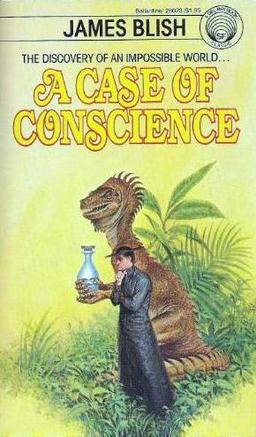 James Blish was an early member of the Futurians, alongside Isaac Asimov, Frederik Pohl, Donald A. Wollheim, Cyril Kornbluth, David Kyle, Judith Merril, and many others. He became a professional SF writer in 1940, with two stories published in buddy Fred Pohl’s Super Science Stories: “Emergency Refueling” (March, 1940) and “Bequest of the Angel” (May 1940).
James Blish was an early member of the Futurians, alongside Isaac Asimov, Frederik Pohl, Donald A. Wollheim, Cyril Kornbluth, David Kyle, Judith Merril, and many others. He became a professional SF writer in 1940, with two stories published in buddy Fred Pohl’s Super Science Stories: “Emergency Refueling” (March, 1940) and “Bequest of the Angel” (May 1940).
He published ten more over the next two years, chiefly in pulps like Stirring Science Stories, Cosmic Stories, Science Fiction Quarterly, and others.
He began to establish a rep in the mid-50s with stories like “Surface Tension” (voted one of the best SF stories of all time, and included in The Science Fiction Hall of Fame, Volume One) and “Common Time.” Famously, a young Lester Del Rey accepted a challenge from fellow editor Damon Knight in the pages of their small fanzine Science Fiction Forum, writing an analysis of “Common Time” that attempted to prove the story was about a man eating a ham sandwich.
I first encountered James Blish not via his novels, nor his short stories, but through another avenue entirely. One of the very first science fiction books I ever purchased — indeed, very likely the first, off a spinner rack in a department store in Nova Scotia — was Star Trek 2, a slender 60-cent paperback collecting Blish’s retellings of eight Star Trek episodes, including “Arena,” “Errand of Mercy,” “The City on the Edge of Forever,” and “Space Seed.”
I loved Blish’s Star Trek books, and read and re-read them incessantly. In some ways, I think they introduced me to Science Fiction (alongside Del Rey’s Runaway Robot and Gerry Turner’s Stranger From the Depths, both from Scholastic Books.)
I remember his Author’s Notes for “The City on the Edge of Forever,” in which Blish obliquely referenced the battle Harlan Ellison had with Gene Roddenberry over re-writing his script, and — very delicately, I thought — said he’d made every effort to incorporate the best elements of both scripts in his adaptation.
All-told, Blish produced 12 volumes of Star Trek adaptions (what do I call these? “Novelizations” doesn’t really fit, since they’re not novels. “Episode re-writes?” There’s no word for them because they’re practically unique — I don’t know of any other TV series that had every episode written up by a respected SF writer in an anthology format. Maybe I’ll just stick with “Blish’s Star Trek books”) between 1967 and 1977, the last one written in collaboration with his wife after his untimely death in 1975.
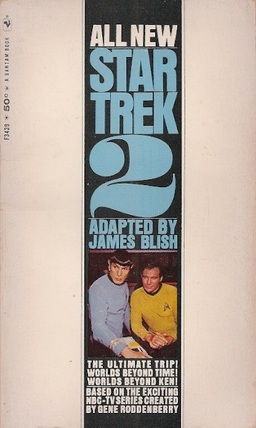 Dutton re-packaged Blish’s classic Star Trek tales in four volumes of The Star Trek Reader between 1976-78, with marvelous new covers by Lou Feck and S. Fantoni. Bantam Spectra re-packaged them into three fat volumes again in 1991, as The Classic Episodes, grouping the episodes rather more logically by season.
Dutton re-packaged Blish’s classic Star Trek tales in four volumes of The Star Trek Reader between 1976-78, with marvelous new covers by Lou Feck and S. Fantoni. Bantam Spectra re-packaged them into three fat volumes again in 1991, as The Classic Episodes, grouping the episodes rather more logically by season.
Running out of episodes to adapt, Blish turned to an original story, in the process creating the Star Trek novelization with his 1970 book, Spock Must Die!, the first original Star Trek novel for adults.
Although it followed Mack Reynolds’s Mission to Horatius (1968), released for the young adult market by Whitman Books, by two years, Spock Must Die! was significantly more successful, virtually single-handedly creating an industry that has now spawned hundreds of volumes and involved too many writers to count.
Today there are many writers producing Trek novels in a variety of different franchises. But for over ten years, there was only James Blish and his name was synonymous with the show in a way that no other SF novelist ever achieved.
Blish also wrote SF literary criticism under the pen-name William Atheling, Jr. (He was apparently inspired by Ezra Pound, who wrote criticism as William Atheling). The best of his critical work was collected in The Issue At Hand and More Issues at Hand, both published in 1970.
In 1976, the Ditmar Awards created a special category for excellence in science fiction and speculative criticism, The William Atheling Jr. Award for Criticism or Review. The award was given out in 1976, 1977, 1998, 2000, and 2007.
After years working for the Tobacco Institute in the 1960s, James Blish died of lung cancer in 1975. He was inducted into The Science Fiction and Fantasy Hall of Fame in 2002.
The Best of James Blish includes an introduction by Blish’s fellow Futurian Robert A. W. Lowndes, editor of Future Science Fiction, Science Fiction, and Science Fiction Quarterly, among many others. As an Afterword, it also includes one of his William Atheling, Jr. columns, “Probapossible Prolegomena to Ideareal History,” originally published in Foundation 13 (May 1978).
Here’s a scan of the back cover text (click for a bigger version), with the complete blurb and Del Rey’s trademarked short story teasers:
Here’s the complete contents:
Table of Contents
Science Fiction the Hard Way, by Robert A. W. Lowndes
“Citadel of Thought” (Stirring Science Stories, February 1941)
“The Box” (Thrilling Wonder Stories, April 1949)
“There Shall Be No Darkness” (Thrilling Wonder Stories, April 1950)
“Surface Tension” (Galaxy, August 1952)
“Testament of Andros” (Future Science Fiction, January 1953)
“Common Time” (Science Fiction Quarterly, August 1953)
“Beep” (Galaxy, February 1954)
“A Work of Art” (Science Fiction Stories, July 1956)
“This Earth of Hours” (Fantasy and Science Fiction, June 1959)
“The Oath” (Fantasy and Science Fiction, October 1960)
“How Beautiful With Banners” (Orbit #1, 1966)
“A Style in Treason” (Galaxy, June 1970)
“Probapossible Prolegomena to Ideareal History,” by James Blish [as by William Atheling, Jr. ] (Foundation 13, May 1978)
The Best of James Blish was published by Ballantine Books in August 1979. It is 358 pages and was priced at $1.95. There is no digital edition. The cover was by H. R. Van Dongen.
The last volume we covered was The Best of Philip K. Dick. So far we’ve covered the following volumes in the Classics of Science Fiction line (in order of publication):
The Best of Stanley G. Weinbaum
The Best of Fritz Leiber
The Best of Henry Kuttner
The Best of John W. Campbell
The Best of C M Kornbluth
The Best of Philip K. Dick
The Best of Fredric Brown
The Best of Edmond Hamilton
The Best of Murray Leinster
The Best of Robert Bloch
The Best of Jack Williamson
The Best of Hal Clement
The Best of James Blish
The Best of John Brunner
See all of our recent Vintage Treasures here.
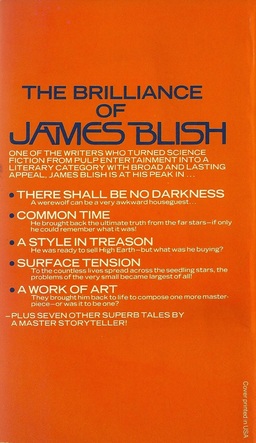
Imperfect as it is, I love “The Beast Must Die” starring Calvin Lockhart. Based on “There Shall Be No Darkness”, it’s my favorite werewolf movie.
Fletcher,
I have to admit I’ve never heard of “The Beast Must Die.” But I found it online as part of an intriguing set of three Peter Cushing horror films called THE AMICUS COLLECTION:
http://www.amazon.com/Amicus-Collection-Asylum-Screaming-Starts/dp/B000TGJ89E/
So, thanks for setting me on the trail! I let you know what I think when it arrives.
Ah yes, “The Beast Must Die”, with the amazing werewolf break right at the climax. http://youtu.be/5heiqWCE3kk
^^ No Spoliers.
Thanks for this post and this whole series. Some random thoughts:
Blish was probably the oddest of the Futurians, a notably odd group of oddballs. I think the first stuff of his that I read were the STAR TREK books, too.
“Beep” was later novelized under the catchy title THE QUINCUNX OF TIME. But I think I like the shorter version better.
With CITIES IN FLIGHT I’d probably rank his novel of psychic powers, JACK OF EAGLES. And A CASE OF CONSCIENCE (and its fellows in the 4-book “trilogy”, After Such Knowledge) I might rank a little ahead of CITIES… but I haven’t reread them recently.
I loved the “Best of” series when I was a teenager, and never caught on that it became a promotional instrument of the publisher. I probably would have become a Jack Vance fan much earlier if he’d had a “Best of” from Ballantine. I guess that confirms Del Rey’s cunning strategy.
Larry Niven was probably not GrandOldManny enough in the 70s for a “Best of” collection. In retrospect, maybe his best work was already behind him, but we didn’t know that then. Happy days.
I think I also read Blish first through the Star Trek books when I was in about 5th grade. I think I was in 7th or 8th when I bought his Best of volume. I was discovering adult science fiction at that time and transitioning from the children’s section to the adult section at the library. I remember seeing all these unfamiliar names in the list of Best of volumes inside the front of the few I’d gotten my hands on and wondering what worlds I might find inside the covers.
Blish has never been one of my favorite writers, but then I’ve only read him at short lengths. Maybe now that I’m older I should go back and give him another try.
Oh, and thanks for the shout-out, John.
> Ah yes, “The Beast Must Die”, with the amazing werewolf break right at the climax.
Black Hat Club,
!!! That is a great clip (and thanks for the “no spoilers” clarification… I wasn’t going to watch it, but figured it couldn’t hurt if it didn’t expose the werewolf).
The DVD is winging its way towards me (as part of the THE AMICUS COLLECTION) this week. Looking forward to watching the whole thing.
Although I wonder if I can get my kids to watch it with me late one Friday night. They’ll probably find it much too old-fashioned… and less frightening than a Buffy episode.
Hey James!
> Blish was probably the oddest of the Futurians, a notably odd group of oddballs.
No argument there. What makes you think Blish was the oddest, though?
> I think the first stuff of his that I read were the STAR TREK books, too.
That was almost universal among SF fans of my early acquaintance. Blish was part of the shared experience of young teen fans… Everybody had read DUNE, THE FOUNDATION TRILOGY, STARSHIP TROOPERS, and at least one Blish STAR TREK book.
> With CITIES IN FLIGHT I’d probably rank his novel of psychic powers, JACK OF EAGLES.
I forgot about JACK OF EAGLES! Thanks for the reminder.
> I loved the “Best of” series when I was a teenager, and never caught on that it became a promotional instrument of the publisher.
I’m pretty sure I discovered many of my favorite writers first through this series. Certainly Edmond Hamilton and Leigh Brackett.
> I probably would have become a Jack Vance fan much earlier if he’d had a “Best of” from Ballantine. I guess that confirms Del Rey’s cunning strategy.
Agreed. I think we should have a “Who Most Deserved a Del Rey Best and Didn’t Get One?” contest.
Of course, it might be more interesting to comtemplate who the 21 writers would be if Lester Del Rey had launched the series today…
> Larry Niven was probably not GrandOldManny enough in the 70s for a “Best of” collection.
Yeah, probably true. But he certainly had a sufficient (and award-winning) body of work by that point.
> I was in 7th or 8th when I bought his Best of volume… I remember seeing all these unfamiliar names in the list of Best of volumes
> inside the front of the few I’d gotten my hands on and wondering what worlds I might find inside the covers.
Keith,
Me too! There were so many names — and I was so impressed with the range of the few authors I did know — that my first impression was how impossibly vast the genre was.
To a certain extent, that feeling still lingers with me today. The sense that SF is bigger than me, and there are countless new books and authors to find. It’s one of the things I really love about our hobby: there are always discoveries to make.
I’ve gotten better at recognizing author names over the years, but even today I rarely walk into a decent used bookstore or Dealer’s Room without discovering something delightful and unexpected.
> Oh, and thanks for the shout-out, John.
You are most welcome!
[…] I was honored to be invited to participate in a Mind Meld article at SF Signal earlier this month. The topic was “Worthy Media Tie-ins,” so of course I took the chance to expand on my love of James Blish’s Star Trek books — particularly Star Trek 2, one of the very first books I ever owned, which I first mentioned a few weeks back in my review of The Best of James Blish. […]
[…] can see my last entry in this series, The Best of James Blish, here, So far we’ve covered the following volumes in the Classics of Science Fiction line (in […]
[…] The Best of Stanley G. Weinbaum The Best of Fritz Leiber The Best of Henry Kuttner The Best of John W. Campbell The Best of C M Kornbluth The Best of Philip K. Dick The Best of Fredric Brown The Best of Edmond Hamilton The Best of Murray Leinster The Best of Robert Bloch The Best of Jack Williamson The Best of Hal Clement The Best of James Blish […]
[…] The Best of Stanley G. Weinbaum The Best of Fritz Leiber The Best of Henry Kuttner The Best of John W. Campbell The Best of C M Kornbluth The Best of Philip K. Dick The Best of Fredric Brown The Best of Edmond Hamilton The Best of Murray Leinster The Best of Robert Bloch The Best of Jack Williamson The Best of Hal Clement The Best of James Blish […]
[…] The Best of Stanley G. Weinbaum The Best of Fritz Leiber The Best of Henry Kuttner The Best of John W. Campbell The Best of C M Kornbluth The Best of Philip K. Dick The Best of Fredric Brown The Best of Edmond Hamilton The Best of Murray Leinster The Best of Robert Bloch The Best of Jack Williamson The Best of Hal Clement The Best of James Blish […]
[…] The Best of Stanley G. Weinbaum The Best of Fritz Leiber The Best of Henry Kuttner The Best of John W. Campbell The Best of C M Kornbluth The Best of Philip K. Dick The Best of Fredric Brown The Best of Edmond Hamilton The Best of Murray Leinster The Best of Robert Bloch The Best of Jack Williamson The Best of Hal Clement The Best of James Blish […]
[…] The Best of Stanley G. Weinbaum The Best of Fritz Leiber The Best of Henry Kuttner The Best of John W. Campbell The Best of C M Kornbluth The Best of Philip K. Dick The Best of Fredric Brown The Best of Edmond Hamilton The Best of Murray Leinster The Best of Robert Bloch The Best of Jack Williamson The Best of Hal Clement The Best of James Blish […]